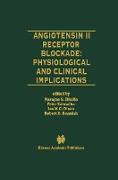Angiotensin II Receptor Blockade Physiological and Clinical Implications
BücherAngebote / Angebote:
The relationship between angiotensin II and hypertension was established in 1898 when angiotensin II was shown to modulate systemic blood pressure. Over the intervening decades, a complete characterization of the renin-angiotensin system (RAS) has been achieved, and our understanding of its biochemistry and physiology has led to the directed development of agents such ·as ACE inhibitors and receptor antagonists capable of controlling hypertension. More recently, it was shown that angiotensin II is secreted within certain tissues and that these tissue-specific systems operate independently of the systemic RAS. The novel concept that angiotensin II regulates a number of cardiovascular processes that are unrelated to blood pressure has renewed the interest of both basic and clinical scientists in angiotensin II. The association between angiotensin II and cardiac growth, in particular, has indicated that therapies currently in use for hypertension may have direct application to the treatment of heart failure. The Manitoba Cardiovascular Forum on Angiotensin Receptor Blockade in Winnipeg was convened October 18-20, 1996 to examine the clinical and basic aspects of angiotensin receptor biology as they apply to hypertension and heart failure. In addition, the potential treatment of these conditions using specific angio tensin receptor antagonists was addressed within the context of their immediate therapeutic application and future potential.
Folgt in ca. 5 Arbeitstagen
